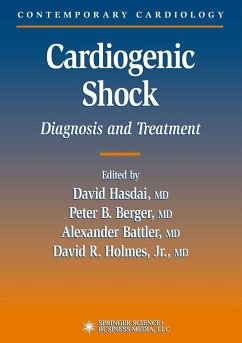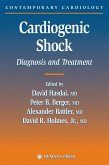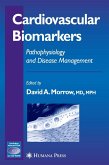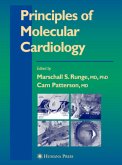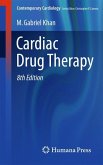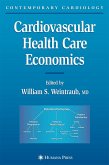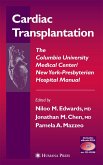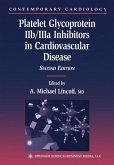Leading world authorities drawn from cardiology, surgery, pediatrics, internal medicine, and basic science comprehensively survey the diagnostic, therapeutic, and prognostic aspects of cardiogenic shock. These experts describe the different scenarios leading to cardiogenic shock, the ways to diagnose their causes, the unique therapeutic options based on those causes, and the outcomes associated with treatment and without. The book also surveys the biochemical and physiological changes that occur in the heart and other organs during cardiogenic shock, the identification of patients at risk for developing shock, and the novel pharmacological agents and assist devices that can help to stabilize the shock patient. Best known as an often fatal complication of myocardial infarction, cardiogenic shock also occurs in patients with a wide variety of cardiac disorders, ranging from congenital lesions in both children and adults, to valvular disease, to myocardial or pericardial disease, tomechanical injuries to the heart. In Cardiogenic Shock: Diagnosis and Treatment, leading world authorities drawn from cardiology, surgery, pediatrics, internal medicine, and basic science comprehensively survey the diagnostic, therapeutic, and prognostic aspects of this dire condition. These experts describe the different scenarios leading to cardiogenic shock, the ways to diagnose their causes, the unique therapeutic options based on those causes, and the outcomes associated with treatment and without. The book also surveys the biochemical and physiological changes that occur in the heart and other organs during cardiogenic shock, the identification of patients at risk for developing shock, and the novel pharmacological agents and assist devices that can help to stabilize the shock patient.
Comprehensive and up-to-date, Cardiogenic Shock: Diagnosis and Treatment consolidates the plethora of available data into a focused clinical manual for diagnosing and treating a major cause of death among patients with cardiac disease.
Comprehensive and up-to-date, Cardiogenic Shock: Diagnosis and Treatment consolidates the plethora of available data into a focused clinical manual for diagnosing and treating a major cause of death among patients with cardiac disease.
" There is an interesting algorithm that is presented in a table to help predict the development of shock for those patients with a ST segment myocardial infarction. These patients are best managed with early angiography and revascularization, if possible. Antiplatelet medications, angioplasty with stents are also indicated. The use of adenosine gets attention here as well as the data that it may prevent no reflow phenomenon. Current data shows that reperfusion in acute myocardial infarction with shock has caused mortality to fall from 70-80 percent down to 50-60 percent due to aggressive management. This includes the intra-aortic balloon pumps, Swan Ganz catheterization and reperfusion with angioplasty and bypass surgery, and thrombolytic therapy. There is a good review of the mechanical complications of acute myocardial infarction shock: ventricular septal defects, severe mitral regurgitation and free wall myocardial rupture. Again, aggressive management seems to get the best results. There is a good chapter on valvular dysfunction including prosthetic valves as a cause of cardiogenic shock. Four chapters are devoted to the use of left ventricular assist devices. The chapter pointing to the future contains many interesting research opportunities, such as cell transplant and genetic engineering. This is a good review of cardiogenic shock and its multiple etiologies. This is a worthwhile addition to the cardiac literature." -Doody's Health Sciences Book Review Journal
"...this is an outstanding book that should be read by anyone who manages patients with cardiogenic shock." -Texas Heart Institute Journal
"Overall, the book is well presented. It is a good review of the diagnostic and therapeutic approaches available in hospitals with full tertiary cardiac services. It summarizes many interesting results from important multicentre cardiology trials of the last decade..." -Canadian Journal of Anesthesia
"The scope of the book is extensive....the editors have assembled a superb panel of experts on the multiple causes of and therapeutic options for cardiogenic shock. Most of the individual contributions provide comprehensive, up-to-date, practical reviews. The organization of the book is well conceived and thoughtful." -Mayo Foundation for Medical Education and Research
"Cardiogenic Shock: Diagnosis and Treatment, divided into seven parts, is a well-written book...I found no shortcomings. It is informative, descriptive, and interesting. It is up to date and useful. This book is recommended for the attending intensivist and cardiologist as well as for medical and surgical house staff who desire a solid understanding of cardiogenic shock." -Cardiovascular Reviews and Reports
"...this is an outstanding book that should be read by anyone who manages patients with cardiogenic shock." -Texas Heart Institute Journal
"Overall, the book is well presented. It is a good review of the diagnostic and therapeutic approaches available in hospitals with full tertiary cardiac services. It summarizes many interesting results from important multicentre cardiology trials of the last decade..." -Canadian Journal of Anesthesia
"The scope of the book is extensive....the editors have assembled a superb panel of experts on the multiple causes of and therapeutic options for cardiogenic shock. Most of the individual contributions provide comprehensive, up-to-date, practical reviews. The organization of the book is well conceived and thoughtful." -Mayo Foundation for Medical Education and Research
"Cardiogenic Shock: Diagnosis and Treatment, divided into seven parts, is a well-written book...I found no shortcomings. It is informative, descriptive, and interesting. It is up to date and useful. This book is recommended for the attending intensivist and cardiologist as well as for medical and surgical house staff who desire a solid understanding of cardiogenic shock." -Cardiovascular Reviews and Reports

